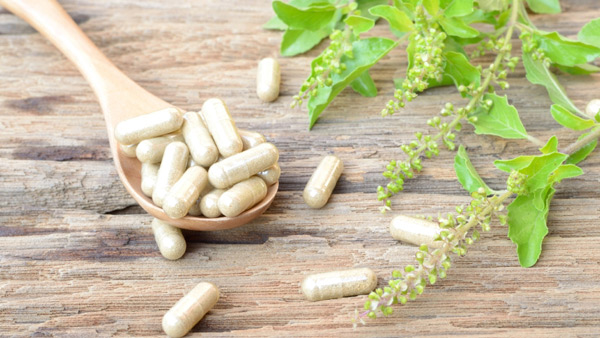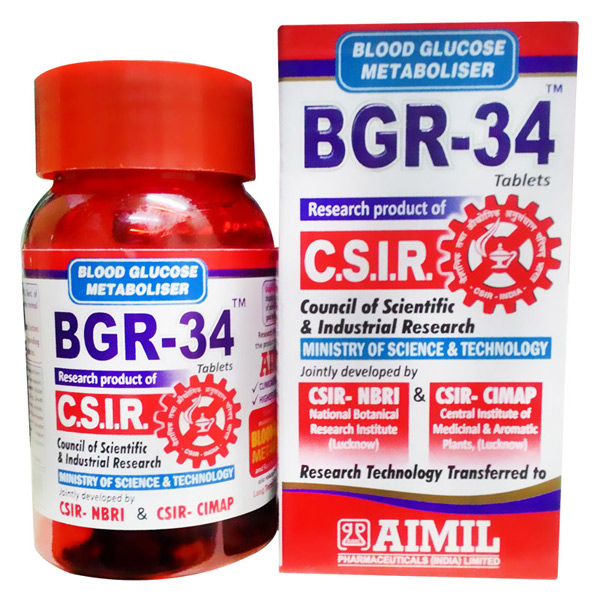|
|
BGR-34: New Anti-Diabetes Herbal Drug

There is great excitement among diabetics in India, a new drug approved by
Indian Government scientific bodies BGR-34 is in the market. An anti-diabetes
herbal drug, jointly developed by two Council of Scientific and Industrial
Research (CSIR) laboratories has been launched in certain parts of North India.
The drug, dubbed BGR-34, has been derived from the medicinal plant extracts as
described in the ancient Ayurveda text.
BGR-34 been jointly developed by National Botanical Research Institute (NBRI)
and Central Institute for Medicinal and Aromatic Plants (CIMAP). For the purpose
of commercialization, the drug licence has been awarded to Delhi-based Aimil
Pharamaceuticals Pvt. Ltd. In return, Aimil will pay royalty based on drug sales
to CSIR.
The drug is available in the form of a 500mg pill which needs to be consumed
twice a day by a patient suffering from Type 2 diabetes. BGR-34 was recently
approved by the Indian ministry that looks after traditional Indian medicines,
AYUSH.
The Livemint reports that the drug was tested on a group of 1000 patients from
the Indian states of Haryana, Delhi, Punjab, Karnataka and Himachal Pradesh. The
study, which lasted for over a period of 18 months, found that the escalated
blood glucose levels of 67 percent of the patients returned back to normal
within three to four days of drug consumption.
�The modern diabetes drugs are known for side-effects and toxicity while BGR-34
works by controlling blood sugar and limiting the harmful effects of other
drugs,� said NBRI scientist A.K.S. Rawat in a statement.
The Huffington Post reports that the drug has the capability to strengthen the
immune system of the patient and also work as an antioxidant. "The drug has
extracts from four plants mentioned in Ayurveda and that makes it safe," said Dr
AKS Rawat, senior principal scientist, NBRI. It has been tested on animals and
scientific study has found it safe and effective, with clinical trials showing
67% success.
The drug boosts immune system, works as antioxidant and checks free radicals.
Though there are other anti-diabetes herbal drugs in the market, 'BGR-34' has
been validated scientifically.
The drug will help maintain normal blood glucose levels, reduce chances of
complications due to persistent high blood glucose levels and impart a good
quality life to patients with high blood sugar levels.
The formulation was launched earlier by the Vice-President Hamid Ansari in
February last year at Vigyan Bhawan, New Delhi, but on Sunday, the product was
launched commercially. It will be available in the form of tablets and may cost
$7.50 for 100 tablets in India.

It is different from existing herbal drugs as it is scientifically tested and
made from four commonly available plant extracts like gurmar leaves which make
it commercially viable. Gurmar, scientifically known as Gymnema sylvestre, is
known to stimulate the pancreas to produce more insulin.
�We are planning to reach around 100,000 doctors through 800 medical
representatives to explain the benefits of our drug,� said Anil Kumar Sharma,
vice president of Aimil Pharamaceuticals.
But endocrinologists are skeptical about the efficacy of herbal drugs.
�Herbal medicines are not cheap, we don�t know the long-term side-effects of
these drugs, the mechanism of action; there is hardly any data available, and we
hear these things from newspapers over reputed scientific journals,� said Shyam
Kalavalapalli, a Hyderabad-based endocrinologist.
Contrary to the claims of no side-effects, herbal medicines were found to have
high concentrations of heavy metals in many studies, Kalavalapalli said.
Diabetes is a non-communicable disease affecting close to 382 million people
around the world. India alone accounts for over 65 million cases, according to
data from the International Diabetes Federation.
The number of people with diabetes is expected to rise to 592 million globally
with 109 million in India by 2035, Belgium-based International Diabetes
Federation estimates. Type-2 diabetes is the most prevalent form of diabetes,
accounting for 85-95% of the cases.
Dated 04 December 2015
|
|
|
|
|









